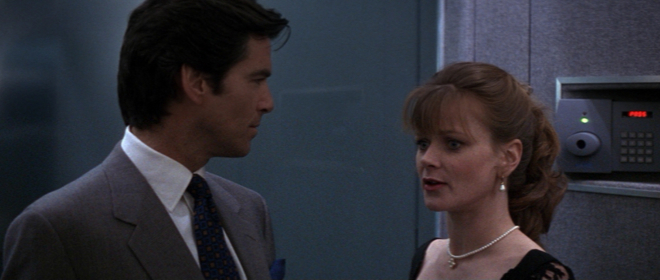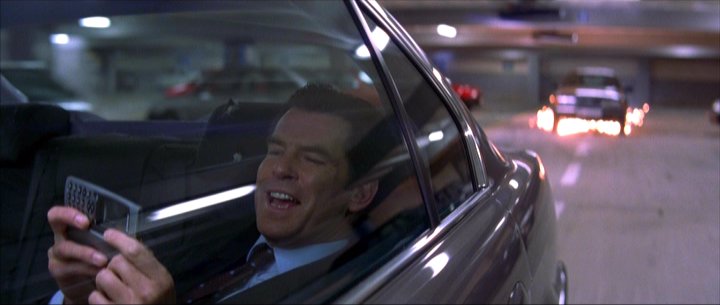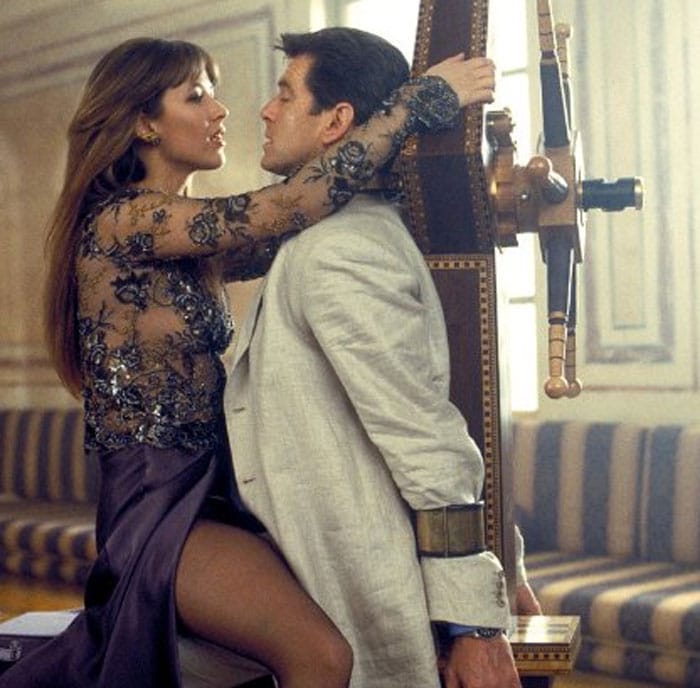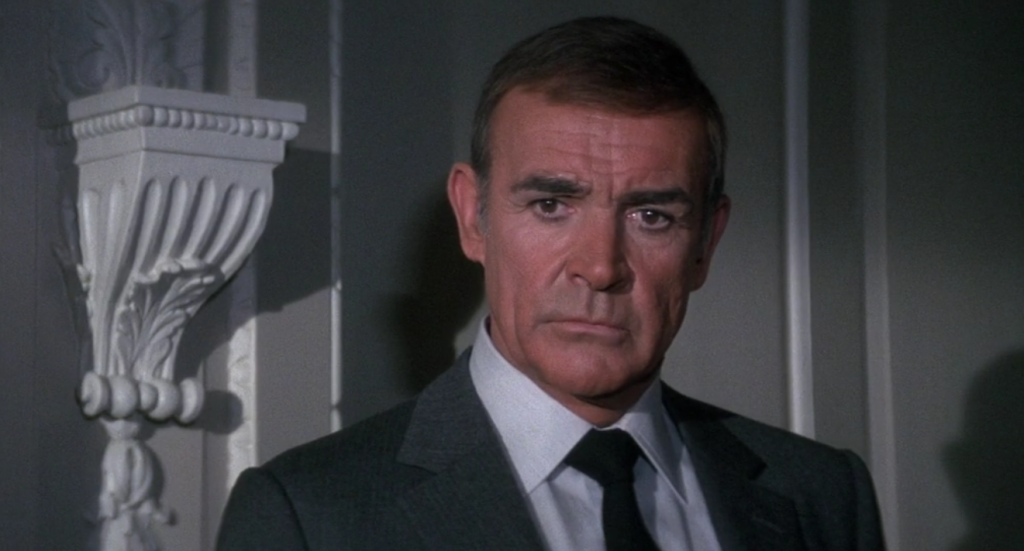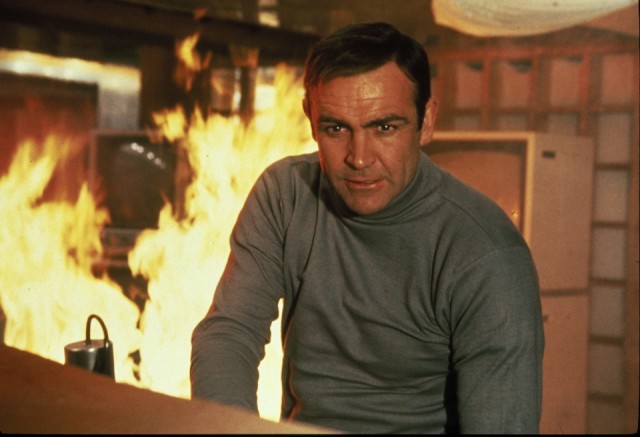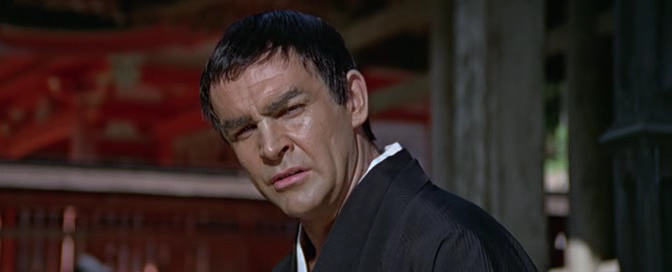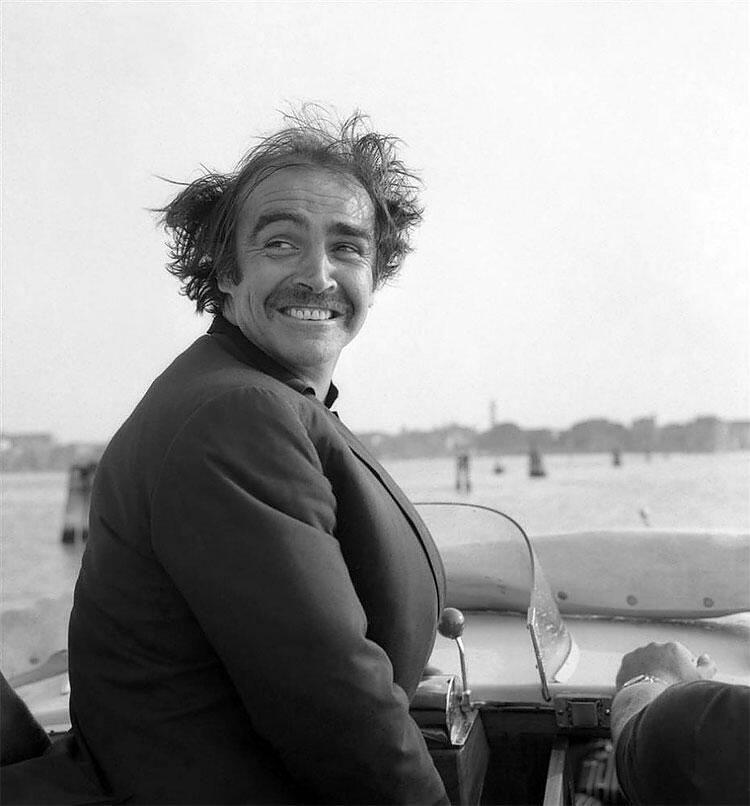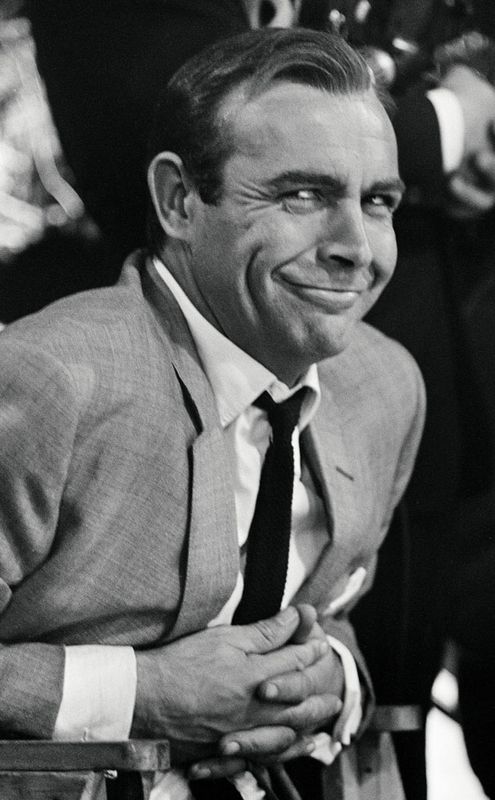"I thought you hadn't even watched a Daniel Craig Bond movie", you ask incredulously. Thanks for reminding everyone, fictitious question raiser. It's true. I did say all those things and I had never watched a Daniel Craig Bond movie all the way through until watching them for this article.
And yet it's so abundantly clear that the man is James Bond. I still stand by my assertion that Pierce Brosnan is the definitive Bond but Craig is the best Bond. As soon as I finished watching Casino Royale I searched my feelings and knew it to be true.
 |
| "The name's Bond. James Bond." - Yes it is Daniel Craig, yes it is. |
And let's talk about Casino Royale for a bit because hot barrier which impounds water or underground streams is that a great movie. Now it may be lacking the gadgets and/or more fantastical elements of previous installments in the Bond franchise but as a movie, it is so well constructed and expertly shot with such an intelligent script and perfect little touches that it might be the best James Bond film.
Again, I know, sacrilege. It has to be Goldfinger or some other Connery film the purists exclaim, with the occasional Brosnan fan giving a shout out to GoldenEye. Surely it has to be one of the films in the franchise with the clear iconography of James Bond, right? Ridiculous moments, disposable women, and a megalomaniac villain who has an evil base in a volcano and a holiday cottage in his underwater lair.
But Casino Royale has all of that, just in the most subtle way possible for a Bond film. You have the unique villain with some distinctive quirk, in this case he weeps blood and has asthma. Asthma? Well that's almost too quirky. You have the ridiculous moments even if they are grounded in some sort of reality and a disposable woman (singular) so it's all there, it's just done in a more subtle way than the excess of the past.
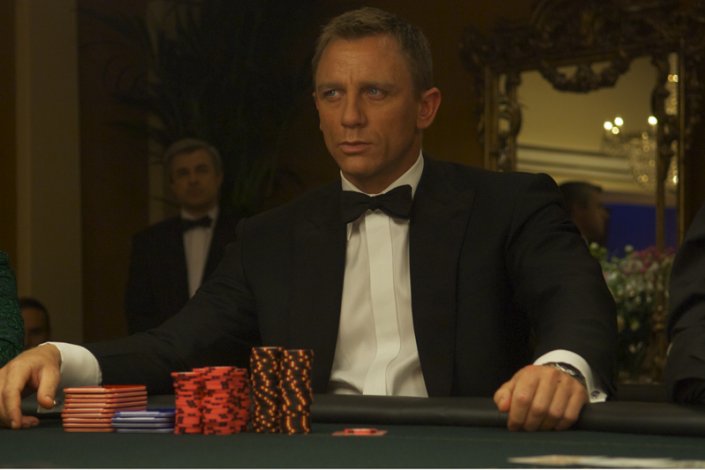 |
| He even wears a tuxedo and gambles. |
However, while this feels very much like a Bond film, right from the get-go the film makes it clear that this is a very different type of Bond movie with a very different type of Bond. The movie starts in black and white with what is essentially a film noir flashback/prequal scene that is near artsy. There are a lot of odd angles and interesting shots going on in that scene.
Also, this introduces Craig's Bond and specifically, the physicality and brutality of this Bond. He isn't a smooth operator who never gets ruffled ending a scuffle with a quip, he moves and feels like a fighter. The first fight in this film is utterly brutal. Bond and his target both grapple with each other exchanging blows and move with the thuggish fluidity of trained killers.
 |
| "Easy, I've got some tension in my neck." |
Where in previous movies Bond's fights with bad guys might have lacked heft or weight, you feel each and every blow in this fight. And then Bond drowns his target in the sink, holding his head down in the water. Although Bond kills all the time in the other films, it is rather disconcerting in a way because this death really feels like murder since it is so violent and so visceral.
It's great scene and sets up the modern, muscular, thuggish James Bond we'll see in the film. But the scene that follows the title credits is even better. I am of course referring to the parkour chase scene where Bond pursues a bomb maker through a construction site. It is a brilliant piece of action and has so many little moments that just work.
Because they don't make Bond quite as good that guy he's chasing. While that guy is running up metal beams and slipping through narrow spaces with an effortless grace, Bond crashes through the walls and manages to keep pace but with none of the fluidity or ease of the man he's pursuing.
 |
| I wasn't joking. He literally crashes through a wall in pursuit. |
That there is someone who is better than Bond at something is actually a nice touch since it never really happened in previous films. It's only Bond's stubbornness which won't let him quit, so through sheer resolve and brute physicality he manages to win out in the end.
I haven't even gotten to Eva Green's Vesper Lynd yet. She is amazing. Possibly the best Bond girl ever, or at least the most capable and fleshed out. And while we'll get to Bond in a minute, that is probably the most significant difference about this Bond film: the characters actually feel real rather than one-dimensional. This wasn't often the case on previous Bond films, especially when it came to the Bond girl.
Vesper is an intelligent, seductive, complicated, and intriguing character played to perfection by the utterly gorgeous and grossly talented Green who pulls off a real convincing English accent for a Frenchwoman. Her character is complex and there are several layers to the performance that gives her gravitas.
Furthermore, and here's the lemon twist, she has a real impact on the plot of the film, not to mention shaping this James Bond into the man he will become. She is the woman for whom he lowered his guards and who most drastically impacts his life. And she has such an impact since she is his equal, not a disposable sex lady but a woman he can love.
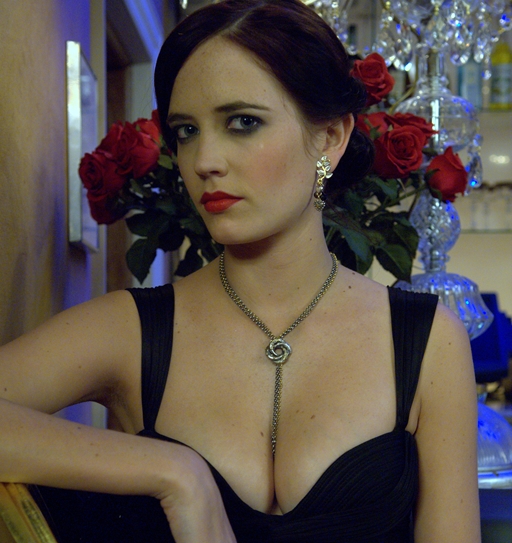 |
| I mentioned she's played by Eva Green, right? |
Green is such a fantastic actress that she embodies Vesper with such a seductive reality she is near irresistible and sells every moment on screen. And Craig matches her step for step. I told you that we were getting to Bond and here we are, getting to Bond.
Craig is the best actor to play Bond. While Connery definitely was an iconic actor, that's the thing, he was an iconic actor. He didn't disappear into his characters, you always knew you were watching Sean Connery. He was of those actors that played a type (in this case, suave, sophisticated yet roguish) but played it so goddamn well that it was incorporated into every role he played.
On the other hand, Brosnan is a fine actor but maybe due the scripts he was handed or the direction he was receiving, most of his Bond films require hurt acting when he would thrust out his lower jaw in pain or when he seemed a little stiff in the role on the odd occasion. (I know I'm doing Roger Moore and Timothy Dalton a disservice by not mentioning them but I haven't watched their films so I can't comment.)
But Craig is an actor with some serious acting chops. Perhaps this is why his Bond is the first that feels less like an archetype but a real character with backstory and depth beyond a tuxedo and witty quips.
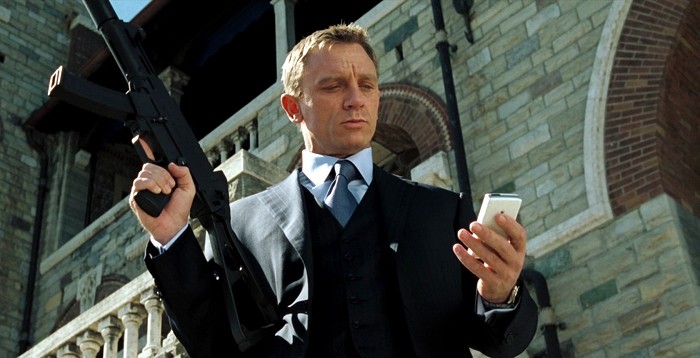 |
| "Apparently there's a new app called 'Xposition' that provides an easily downloadable backstory to flesh out your character." |
There are a lot of little nuances in his performance, most of which are conveyed through his eyes, those beautiful baby blues which somehow can express heartbreak and steel up in a second while his face remains stoic. Seriously, watch his eyes. It's all there. The intensity and determination, the rare glance of wry humour, the condensation, the pride.
And that intensity feeds into the way in which he delivers his lines. Now this obviously relates to the scripts he has to work with but Craig's Bond doesn't quip. A line which would have been delivered tongue-in-cheek or a wink by a previous Bond here is delivered as a line someone would say, which actually makes it more effective.
Think about the exchange where Bond is asked by the corrupt MI6 section chief in the black and white prologue how did his contact die, Bond's response is "Not well". Where this would have been delivered with a slight wink at the audience or even a more silly reply like, "He was a little flushed", Craig delivers the line straight giving it more weight, a full-bodied retort rather than throwaway quip.
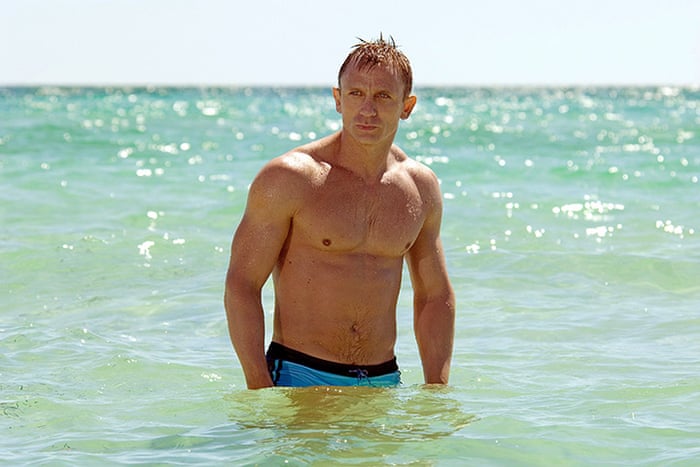 |
| And talking about full-bodied... |
Craig's Bond is physical. More so than any Bond before him. The only Bond I think who could be considered really physical before Craig would be early Connery. And Craig has a great body. This is not to say that previous Bonds weren't fit (although sometimes they weren't, You Only Live Twice Connery) but Craig has a real good body and is in fantastic shape.
The film even comments on his body during the torture scene when Le Chiffre repeatedly swings a heavy knotted rope into Bond's balls. And it is Le Chiffre who makes the comment, right before he starts the worst case of blue balling ever saying, "Wow, you've taken good care of your body". Which he has, he has indeed.
Built like a boxer, this is a man who works out and keeps care of his body through rigorous excercise. I think I might have mentioned on this blog before how there has been a shift in the past 10-15 years to more ripped male bodies on screen, and although Craig isn't ripped, he definitely fits more into this trend than his predecessors.
This isn't to dismiss or body-shame previous Bonds, just to highlight what an impressive body Craig has and shifting ideals of the ideal male form in recent years. Craig is also perhaps the least hairy Bond, at least out of Connery and Brosnan which might be natural or part of this trend, I dunno. Again, this isn't to hair-shame Connery or Brosnan, especially since Brosnan has the most impressively hairy chest.
 |
| Dammit, turn down the sex appeal. Jeez. |
But I think we should move on to give some measure of relief from the awesome of Casino Royale and shirtless James Bonds, so let's discuss Quantum of Solace, shall we? As a direct sequel to Casino Royale (a rarity for a Bond film), it is often seen as the lesser sibling of Craig's first two outings as Bond.
However, watching them relatively close together, there is a lot to love in Quantum. It's almost like the two films make a great four hour movie if played one after each other, even if the second half isn't as good as the first.
That said, the opening car chase is one of the best car chases put to film. While it is rather chaotic to follow and the editing is frenetic, there is so much well-choreographed exhilaration on screen it's just an impressive action sequence.
 |
| I don't think I could adequately caption badassery of this magnitude. |
I have to spend a moment here to talk about the theme song by Jack White and Alicia Keys, 'Another Way to Die'. This is generally not regarded as one of the better Bond songs and has actually been quite heavily criticised. And I understand the criticisms mostly because I have no idea what Jack White and Alicia Keys are doing on the same song.
No really, why are they both on the song? The Bond films aren't known for having duets on their theme songs, indeed this is the first Bond theme duet so there is no precedent for two completely unrelated singers with completely different styles singing together on a Bond theme. It doesn't even sound like they were in the same room when they sang their parts. Keys appears to be singing in a different key than White at points and I don't know why it's happening.
It's not even written like a duet where they trade lyrics or parts that have to be sang with two singers. They're just singing together because reasons. It's so obviously a Jack White song I don't know why Keys is even there, not to be mean to her but just out of sheer curiosity.
And all this is a shame because I quite like the song despite it's flaws. I like the horns and White's guitar. I even enjoy the scat-like verses, and appreciate the different set pieces which come in and out like the piano v. guitar bits. Also, it's pretty much in sync with the opening credit's visuals which I always like. For example the first gun shot shoots off perfectly in time with a horn blast following the guitar/drum build up, which is neat.
Now Quantum has its problems, it's lacking in humour for the most part and seems less coherent than Casino Royale, lacking the synergy that movie had. However, it is possibly the artsiest Bond movie, at least of the ones I've seen. There is quite a bit going on here even if it doesn't quite come together.
And now for something completely related, the fight scene at the opera is simply stunning and oh-so-arty. Inter cut with shots from the opera, the sound drops out with some exceptional Foley work that seems dissonant from the action on screen. Guns shoot onscreen and the sound is heard but almost as though it is completely removed from the action even though it happens at the same time. Maybe the sounds are a second delayed? However it was done, it's a great piece of film-making.
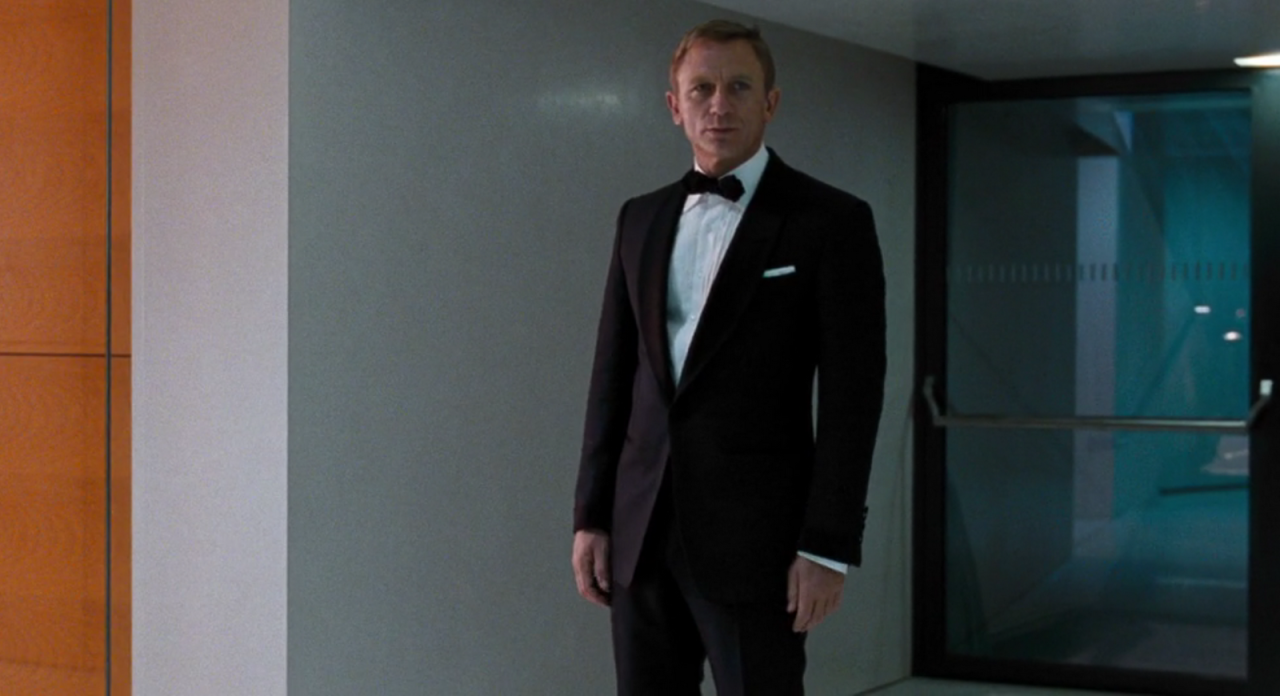 |
| Also he looks damn good in a tuxedo he just happened to find in a locker which somehow fits him like a glove. |
The plot of Quantum on the other hand less something to be desired. Not because it is terrible but it was really hit by the Writer's Strike back in 2007 and feels oddly disjointed as a result. This is the main contributor to the incoherence I mentioned earlier.
At one point, Bond is in Austria and his funds are frozen because he is suspected of killing the bodyguard of an adviser to the English Prime so he can't pay for a plane ticket to Boliva. Fair enough. Then Bond is in Italy and convincing his ally of sorts Mathis to get him to take Bond to Italy.
Wait, hold up. How did Bond get to Italy? I mean, Austria isn't too far from Italy... if you're travelling by plane or even train but how did Bond makes his way to Mathis' retirement villa? Did he walk there? Did he steal a car?
This is like the cut in The Dark Knight Rises from Bruce Wayne escaping the prison pit somewhere in the Middle East to somehow getting to Gotham city in time. The movie doesn't want you to ask how he got there or how long it took him either. It's just saying he is there now so let's roll with it, okay?
 |
| He also had the time to put gasoline on ice and up a massive bridge in the shape of a bat... somehow. |
And that segue ways nicely into Skyfall. While making all of the money at the box office on it way to becoming the most successful British film of all time, some people couldn't help but notice that Skyfall seemed to be influenced in part by Christopher Nolan's Dark Knight trilogy.
Which is fitting since The Dark Knight Rises stole its plot from The World Is Not Enough and Chrisotpher Nolan a well-known Bond fan, the whole thing coming full circle with Skyfall cribbing from the success of the Dark Knight Trilogy. Bond films have always taken what is currently popular or in vogue and incorporated it in some measure to the latest Bond film.
The bad guy in Skyfall is definitely supposed to be like Heath Ledger's Joker in The Dark Knight, 20 steps ahead of everyone else, playing off events like a puppet-master. He even allows himself to be capture like the Joker so he can actually lay a trap which makes no sense when you stop to think about the logistics of having your plan hinge on a thousand things you have no control over.
 |
| But with hair like that, why would you ever stop to thing about logistics? |
Plot problems aside, Skyfall is a fantastic film and definitely is the most gorgeously shot Bond movie. It is utterly stunning how well shot this film is. Judi Dench gives one of her best performances as M which is saying a lot considering that she's a Dame.
M is a strong and forceful character but there's a scene where Silva is threatening M and she is absolutely terrified but trying not to show it and restraining herself. Her fear is only shown in her eyes which give off such a look of outright terror despite her resolve. It is an impressive feat of acting bar none.
And despite his plan riding all on luck or the fact he's omniscient, Javier Bardem's Silva is a great and truly memorable villain. His idiosyncratic manner of talking, his fey mannerisms, homoerotic relationship with Bond, white suits and bleached blonde hair all culminate in Bardem's amazing perrfomance. And his scenes with Craig and Dench are just fabulous to watch.
 |
| Thanks for waiting Mr Bond, we were just getting to you. |
But back to Bond. I'll say it again, Daniel Craig is the best Bond. The man is great and brought a new physicality, a new vitality, and a new authenticity to the character that none of the previous actors quite managed to do.
I love Connery and Brosnan's Bonds and have nothing against Moore, Lazenby, or Dalton's, but Craig is James Bond.
Even if he is too blonde.
Announcement:
Musings From Another Star will be on hiatus for a couple of weeks while I battle sharks with lasers attached to their heads.
But I'll be back after watching my lover suicide-drown herself before my very eyes in order to motivate my character.
References:
Daniel Craig Wikipedia page
Roger Moore on Why Daniel Craig Is the Best James Bond Ever and What 007 Role He’s Dying to Play - Time
Has Daniel Craig eclipsed Sean Connery as James Bond? - The Guardian
Daniel Craig Is Esquire's October Cover Star
My favourite Bond film: Casino Royale
19 Casion Royal (with Matt Gourley) - The Canon
James Bonding #006: Casino Royal with Amanda Lund & Maria Blasucci
James Bonding #004: Quantum of Solace with Emily Gordon
James Bonding #002: Skyfall with Steve Agee
10 Ways Skyfall Borrows From the Dark Knight Playbook
5 Huge Movies That Stole Their Plot from Other Hit Films





